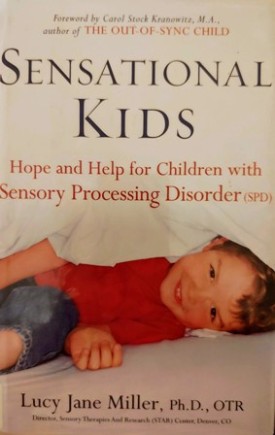Description
Sensational Kids – Hope and Help for Children with Sensory Processing Disorder (SPD)
By Lucy Jane Miller, Ph.D., OTR
Sensational Kids is written by the author of “The Out-of-Sync Child” and is a practical guide to understanding and treating Sensory Processing Disorder (SPD).
Sensory Processing problems are considered a symptom of Autism, however children with ADHD, OCD, and other developmental delays, or sometimes no diagnosis at all, can suffer from Sensory Processing Disorders. We all have some sensory problems, but it becomes a disorder when the impact is chronic and disrupts daily life.
Children who have difficulty integrating information received from the senses can be overwhelming and can result in confusing behavior such as being anxious, irritable, angry, fearful, picky, oversensitive. These children experience the five senses, sight, touch, taste, smell, and sound differently than other children their age. They are overwhelmed by light, feathery touches or might not know the meaning of personal space.
I find SPD difficult to describe. Here is a list of difficulties that someone with SPD might display. If your daily life is disrupted by any of the following you might check out the book, “Sensational Kids”.
-Heightened reactivity to sound, touch or movement
-Under-reactivity to certain sensations e.g. not noticing name being called, being touched, high pain threshold
-Seeking increased amounts of auditory, tactile or movement input e.g. making noises to self, constantly touching objects/people, being “on the go”
-Appears lethargic/disinterested; appearing to mostly be in own world
-Difficulty regulating own behavioral and emotional responses; increased tantrums, emotional reactive, need for control, impulsive behaviors, easily frustrated or overly compliant
-Easily distracted, poor attention and concentration
-Poor motor skills; appears clumsy, reduced coordination, balance and motor planning skills, poor handwriting
-Difficulty mastering activities of daily living e.g. dressing, tying shoelaces, self-feeding
-Poor sleep patterns
-Restricted eating habits or picky eater
-Difficulty engaging in grooming tasks e.g. hair-brushing, hair-washing, nail cutting etc
-Loves movement and appears to have a need for intense pressure, continually seeking this out e.g. constant spinning, running around, jumping, crashing in objects/people
-Avoids movement-based equipment e.g. swings, slides etc
-Appears floppy or has ‘low muscle tone’, tires easily and is often slumped in postures
-Does things with too much force, has big movements, moves fast, writes too light or too hard
-Delayed communication and social skills, hard to engage in two-way interactions
-Prefers to play on their own or difficulty in knowing how to play with other children
-Difficulty accepting changes in routine or transitioning between tasks
-Difficulty engaging with peers and sustaining friendships




Reviews
There are no reviews yet.